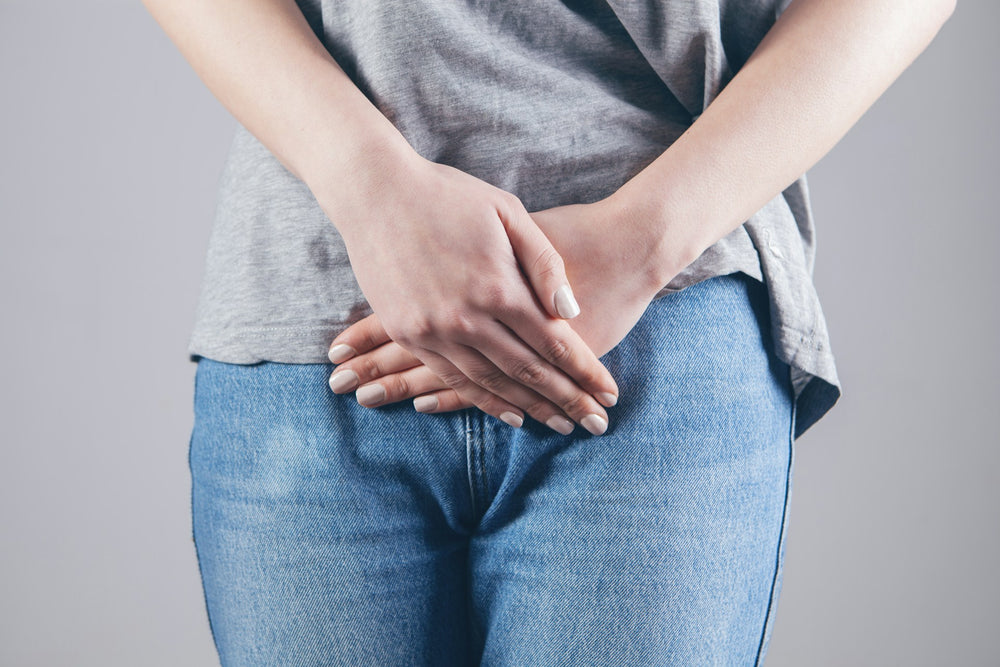
The Best Supplements for Poor Digestion and Bloating
Bloating is a feeling of tightness, fullness, or pressure in the belly. Not only is it physically uncomfortable, but it can also make your stomach look larger than it is.
If you struggle with bloating, you’re not alone. Most people only experience bloating on occasion, though 10% of people experience it regularly. Frequent stomach bloating may suggest that you have an underlying digestive issue or food intolerance. Certain vitamin deficiencies can also play a role.
So, how can you beat the bloat? In this article, we’ll explore the best vitamins for bloating, as well as supplements and lifestyle changes that may ease your symptoms.
What Causes Bloating?
Bloating has a wide range of potential causes. Some of the most common culprits behind a bloated belly include:
- Eating or drinking too fast
- Swallowing air
- Consuming gas-producing foods
- Overeating
- Food intolerances, such as lactose or gluten intolerance
- Digestive disorders, such as constipation or irritable bowel syndrome (IBS)
- Gut bacteria imbalances
- Hormonal changes
- Stress
- Certain medications
If you want to get to the bottom of your bloating, you may need to enlist the support of a healthcare professional. Your doctor can review your diet, medical history, and test results to determine the root cause.
Learn More: 6 Causes of Bloating (and What to Do About it)
Which Vitamin Deficiency Causes Bloating?
Nutrient deficiencies can have notable impacts on nearly every aspect of your health, including your digestive health. Some nutrient deficiencies that may cause your gut health to suffer include:
- B vitamins
- Vitamin D
- Magnesium
- Zinc
Let’s take a closer look at how each of these vitamins and minerals can influence your digestive system.
B Vitamins
B vitamins can impact your digestive health in a variety of ways. While each B vitamin has a unique function within the body, many of them play a role in:
- Assisting with nutrient absorption
- Supporting healthy diversity of gut bacteria
- Maintaining the structure of your gut lining
- Regulating gut inflammation
If you don’t consume enough of these vitamins in your diet, you may experience gut inflammation and microbiome imbalances, both of which can contribute to bloating and other digestive issues.
Vitamin D
Vitamin D may help lower gut inflammation and calcium absorption.
Your skin naturally produces vitamin D when it gets sun exposure. However, not everyone gets enough sunshine year-round to meet their daily requirements. What’s more, dietary sources of vitamin D are rather sparse.
Due to this predicament, more than 35% of U.S. adults have a vitamin D deficiency. If you’re one of them, you may develop bloating in response to deficiency-related gut inflammation, microbiome disbalances, or poor nutrient absorption.
Fortunately, you can solve vitamin D deficiency quite easily through supplementation. One study of 90 people suffering from IBS found that vitamin D supplementation led to substantial improvements in bloating, gas, and stomach pain.
Learn More: Vitamin D: SO Much More than Just a Vitamin
Magnesium
Magnesium is an essential mineral that muscle relaxation, gut motility, and intestinal hydration.
Thanks to its laxative-like properties, magnesium can help your stool move smoothly through your digestive tract. Magnesium may also mitigate bloating by preventing constipation.
Zinc
Zinc is an essential mineral that supports healthy reducing intestinal damage and lowering inflammation.
Due to zinc’s impact on intestinal health, zinc deficiency is quite rare in the United States.
10 Supplements to Help With Bloating
Now that you know how certain vitamin deficiencies can influence your gut health, let's take a look at some evidence-based supplements that can help you keep bloating at bay.
If you and your doctor determine that you’re deficient in any of the nutrients listed above, you may want to consider taking them in supplement form. Thus, our first four suggestions are:
- B vitamins
- Vitamin D
- Magnesium
- Zinc
Along with these four essential nutrients, here are six more worthwhile supplements to combat bloating:
#5 Fiber Supplements
By adding bulk to your stool, fiber can help prevent and relieve constipation, a common cause of bloating.
Psyllium husk is a popular fiber supplement with a lot of research to support its digestive benefits. Just take a look at what the science has to say:
- In one study, participants who took 10 grams of psyllium twice per day saw their constipation improve.
- In an animal study, mice who consumed psyllium reduced their intestinal inflammation significantly.
- A 2021 systematic review found moderate evidence to support the use of psyllium in chronic constipation management.
While soluble fiber can assist with bloating, it may have the opposite effect if you increase your consumption too quickly. With that in mind, it’s important to increase your intake gradually and drink plenty of water throughout the process.
#6 Probiotics & Prebiotics
struggling with IBS. Just keep in mind that it may take several weeks of supplementation to see the difference.
Learn More: Best Prebiotic and Probiotic Combo to Take
#7 Digestive Enzymes
Digestive enzymes help your body break down carbohydrates, fats, and proteins into smaller compounds that are easier to digest. The different types of digestive enzymes are as follows:
- Amylase helps break down starches.
- Lactase helps break down lactose, a sugar found in dairy products.
- Protease helps break down proteins.
- Lipase helps break down fats.
- Maltase helps break down maltose.
- Sucrase helps break down sugar.
While your body produces these enzymes naturally, some people with digestive issues may struggle to produce certain digestive enzymes in sufficient quantities.
Fortunately, research shows that digestive enzymes may improve several digestive issues, including bloating, just as effectively as prescription medication.
#8 Peppermint
Many people herald peppermint for its soothing properties. In addition to easing headaches and joint pains, peppermint may also aid indigestion. That’s because this herb contains L-menthol, a compound that can suppress intestinal muscle spasms.
Several studies assert that taking peppermint capsules or peppermint oil may help relieve IBS symptoms, including stomach pain and bloating. In one of these studies, 75% of participants saw significant reductions in their IBS symptoms.
#9 Ginger
Ginger is a root that may have anti-inflammatory and antioxidant effects. Many people use ginger to relieve nausea, and some research suggests it may indirectly help prevent bloating by alleviating indigestion.
#10 Fennel
Fennel is a flavorful plant with medicinal properties. By relaxing the smooth muscles of the digestive system, it may help combat bacteria that cause indigestion and diarrhea.
6 Tips to Relieve Bloating
Adding a high-quality supplement to your daily routine may be enough to resolve your bloating blues. If not, you can also try out the following tips:
- Eating smaller portions – Consuming large amounts of food in one sitting can overwhelm your digestive system. That’s because your stomach must expand to accommodate the food, contributing to the sensation of fullness and pressure. Large portions can also slow down your digestion, increasing gas-producing fermentation.
- Eating slowly – Scarfing down your food may be tempting if you’re super hungry, but it can cause you to swallow air unintentionally. As this trapped air moves through your digestive system, it can lead to bloating down the line.
- Exercising regularly – Moving your body can help stimulate your digestive system and relieve trapped gas. Exercise is also an excellent tool for managing stress.
- Enhancing your hydration – Drinking enough fluids can reduce the chances that you develop constipation. Proper hydration may also flush out excess sodium, a common bloating culprit. And while it may seem counterintuitive, drinking enough water can prevent excess water retention.
- Eating a balanced diet – While supplements can help you cover your nutritional bases, you can get many of your essential nutrients and fiber from eating a balanced diet.
- Excluding problematic foods – If you notice that you always get bloated after eating certain foods, such as cruciferous vegetables, dairy products, or fried foods, you may want to cut them out of your diet for a while or get tested for food intolerances.
Best Supplement Products to Help With Bloating
If you want an all-in-one supplement that contains vitamins to help with bloating, Vibrant Health has two excellent options: Digestive Vibrance and Maximum Vibrance.
Digestive Vibrance
Digestive Vibrance is our supplement made specifically for people who struggle with bloating. Thanks to its fermentable fibers and diverse probiotics, it’s tailor-made for those suffering from digestive discomfort.
Some of its notable ingredients include:
- 100 billion CFUs of probiotics from 8 different strains
- Acacia gum, a potent prebiotic
- Psyllium husk fiber
- Wheatgrass, which contains magnesium, vitamins A, C, E, K, and B complex
This gut-supporting blend contains each of these ingredients in potent doses to ensure you get the best results. Best of all, it’s delightfully delicious.
Maximum Vibrance
If you want to pack in some protein while improving your digestion, look no further than Maximum Vibrance. This plant-based supplement contains 20 grams of protein, along with:
- 25 billion probiotics from 12 strains
- 4 grams of fiber
- Antioxidant-rich wheatgrass and spirulina
With this impressive list of nutrients, this supplement can enhance your overall wellness along with your digestive health.
Bid Bloating Goodbye With Vibrant Health’s High-Quality Supplements
While bloating is a common experience, it doesn’t have to be your destiny. Understanding the link between vitamin deficiencies and bloating can help you take the right steps to improve your digestive health.
If you’re eager to banish bloating for good, treat your body to Vibrant Health. Both of these supplements contain vitamins that help with bloating. Best of all, they’re both:
- Science-backed
- Clinically formulated
- Dairy-free
- Soy-free
- Gluten-free
- Non-GMO
- Vegan friendly
Ready to revolutionize your digestive well-being? Treat your body to Vibrant Health’s supplements today.

Why Trust Vibrant Health?
At Vibrant Health, we’ve been pioneers in science-backed nutrition for over 30 years, formulating transparently sourced superfood supplements that prioritize real results. Our blog is an extension of that commitment—a trusted resource for expert-driven wellness insights.
Every article is crafted with nutrition expertise, backed by the latest scientific research, and reviewed by our in-house Certified Health Coaches and Product Educators. We break down complex health topics into practical, actionable advice—helping you make informed choices about superfoods, supplementation, and holistic wellness.As a brand that has earned thousands of 5-star reviews and the trust of health professionals, we ensure that our content reflects the same quality, integrity, and transparency as our products.
Your wellness journey deserves accurate, credible, and empowering guidance. That’s why Vibrant Health’s blog is here—to help you live a healthier, more vibrant life, backed by real expertise


